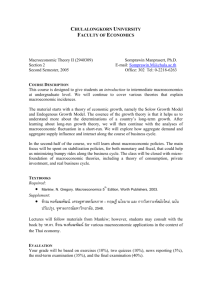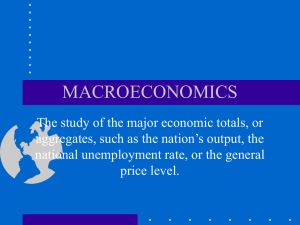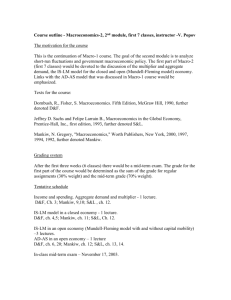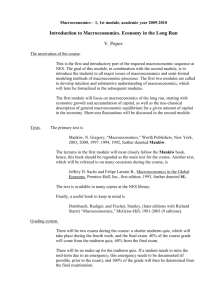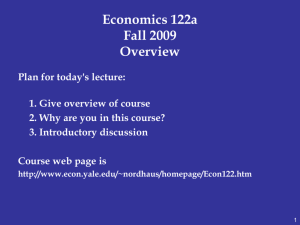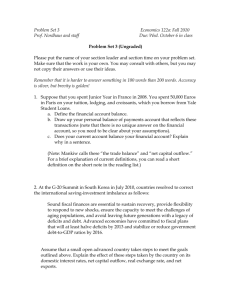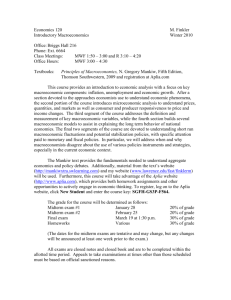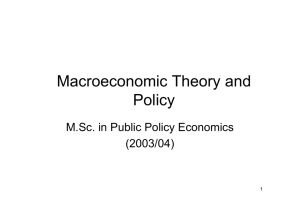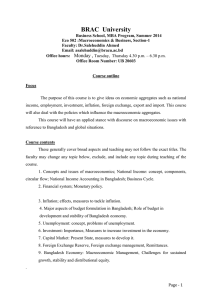Course Outline 2016 ECON 111: MACROECONOMICS Semester 1
advertisement
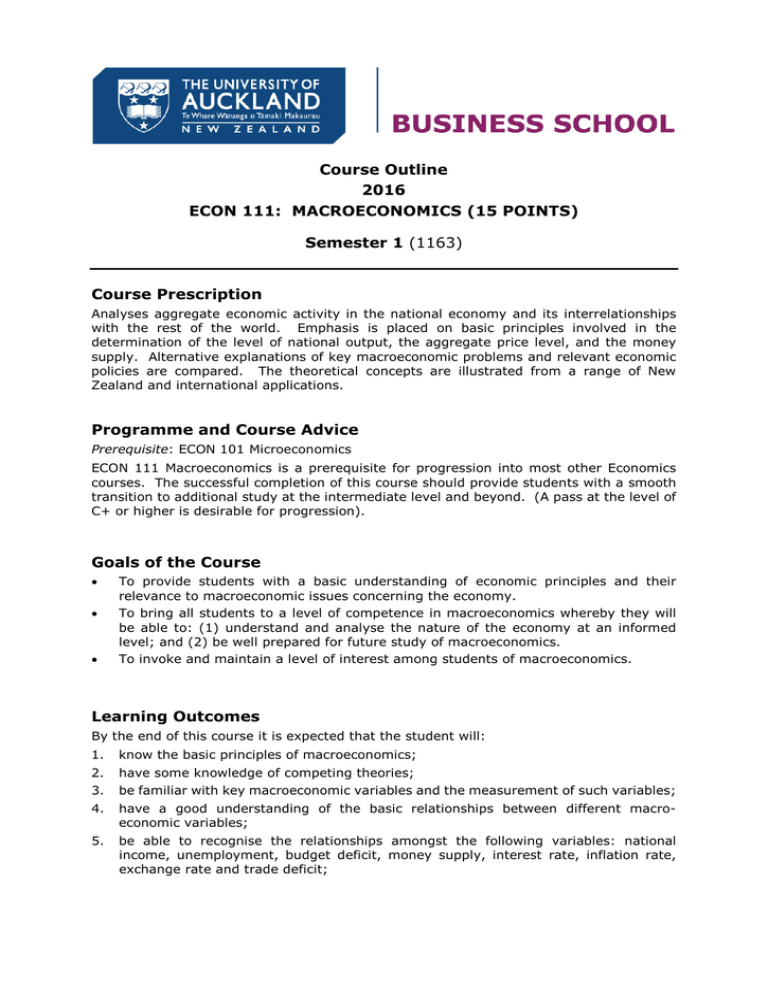
Course Outline 2016 ECON 111: MACROECONOMICS (15 POINTS) Semester 1 (1163) Course Prescription Analyses aggregate economic activity in the national economy and its interrelationships with the rest of the world. Emphasis is placed on basic principles involved in the determination of the level of national output, the aggregate price level, and the money supply. Alternative explanations of key macroeconomic problems and relevant economic policies are compared. The theoretical concepts are illustrated from a range of New Zealand and international applications. Programme and Course Advice Prerequisite: ECON 101 Microeconomics ECON 111 Macroeconomics is a prerequisite for progression into most other Economics courses. The successful completion of this course should provide students with a smooth transition to additional study at the intermediate level and beyond. (A pass at the level of C+ or higher is desirable for progression). Goals of the Course • • • To provide students with a basic understanding of economic principles and their relevance to macroeconomic issues concerning the economy. To bring all students to a level of competence in macroeconomics whereby they will be able to: (1) understand and analyse the nature of the economy at an informed level; and (2) be well prepared for future study of macroeconomics. To invoke and maintain a level of interest among students of macroeconomics. Learning Outcomes By the end of this course it is expected that the student will: 1. know the basic principles of macroeconomics; 2. have some knowledge of competing theories; 3. be familiar with key macroeconomic variables and the measurement of such variables; 4. have a good understanding of the basic relationships between different macroeconomic variables; 5. be able to recognise the relationships amongst the following variables: national income, unemployment, budget deficit, money supply, interest rate, inflation rate, exchange rate and trade deficit; 2. ECON 111 Course Outline 2016 Learning Outcomes - continued 6. be able to understand a simple macroeconomic model based on aggregate demand and aggregate supply; 7. be able to understand the implications of international trade and capital movements for macroeconomic aggregates in a small open economy; 8. be able to understand how government policies affect macroeconomic outcomes and the current debates about the choice of appropriate policies. Content Outline Part 1 Weeks 1, 2, 3: Measuring macroeconomic data (Mankiw, Bandyopadhyay and Wooding Ch 7, Ch 8); Saving, investment and the financial system (Mankiw, et al, Ch 10); Production and growth (Mankiw, et al, Ch 9) Week 4: Unemployment (Mankiw, et al, Ch 12) Weeks 5, 6: The monetary system and inflation (Mankiw, et al, Ch 13, Ch 14) Part 2 Week 7: Aggregate supply and demand (Mankiw, et al, Ch 17) Week 8 Fiscal and monetary policy (Mankiw, et al, Ch 18) Weeks 9, 10: Open economy macroeconomics (Mankiw, et al, Ch 15, 16; St John & Fargher, Ch 10) Week 11 Policy Trade-off for controlling inflation and unemployment (Mankiw, et al, Ch 19) Week 12: Key macroeconomic debates (Mankiw, et al, Ch 20) Learning and Teaching The course will be taught in both the first and second semesters. There will be 3 one-hour lectures and a one-hour small group tutorial per week. The small group tutorials begin in Week 2 of the semester and you are strongly encouraged to attend these. The Business School provides Maori and Pacific Island students with academic and pastoral support through the He Tuākana programme. Information is available at: http://www.business.auckland.ac.nz/en/for/maori-and-pacific/tuakana-tutoring-andmentoring/teina-tuakana-mentoring-programme.html or by emailing: tuakanabusiness@auckland.ac.nz Teaching Staff Mr Gamini Jayasuriya Office: OGGB 692 Tel: 923 3900 (ext 83900) Email: g.jayasuriya@ auckland.ac.nz Course Administrator Mrs Annette Lazonby Office: OGGB 641 Tel: 923 3885 Email: a.lazonby@auckland.ac.nz 3. ECON 111 Course Outline 2016 Learning Resources Prescribed Text: Mankiw, N.G., Bandyopadhyay, D. and Wooding, P. Principles of Macroeconomics in New Zealand, (2nd edition), CENGAGE Learning, 2009. ISBN – 13: 978-0170182089, Albany: www.cengage.com.au/mankiwNZ2e.A A Coursebook will be available for purchase from the Business and Economics Student Bookshop, Level 0, Owen G. Glenn Building. Supplementary Material 'Search me! Economics': A useful resource for writing essays. www.cengage.com/sso Note: the access card to this website is included in the textbook. Additional References St John, S., Fargher, S. Macroeconomics and the Contemporary New Zealand Economy, Pearson Education, 3rd edition, 2004. Dalziel, P. and Lattimore, R. The New Zealand Macroeconomy, Oxford University Press, 4th edition, 2002. Assessment Final Examination Coursework (1 Test) = 60%. = 40% Plussage applies: The Final Grade will be the better of EITHER: (i) Coursework/40 + Exam mark/60 OR: (ii) Exam mark/100 Mid Semester Test Date Semester 1 - Week 7 Monday, 11th April 2016 More details will be provided at lectures and on CANVAS. There is no requirement to qualify for plussage, e.g., you do not have to pass the test to qualify for plussage. The Test and Final Examination will test conceptual understanding and skills associated with the learning objectives. Learning Outcome 1 2 3 4 5 6 7 8 Test X X X X Final Examination X X X X X X X X
